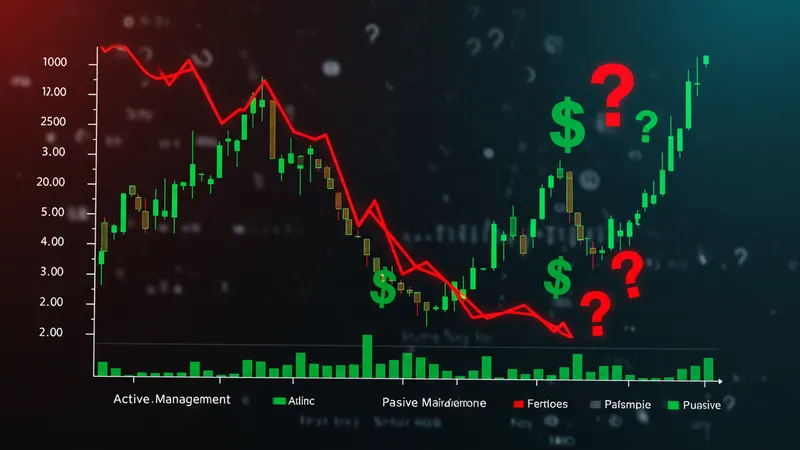

Did you know that mutual funds, often seen as safe havens in the investment world, can actually harbor jaw-dropping risks hidden beneath their alluring returns? This revelation could radically change how you approach investing.
With economies in flux and financial markets more unpredictable than ever, understanding the true nature of risks and returns in mutual funds is crucial. Delve deeper to see why now is the perfect time to reevaluate your portfolio strategies.

Many investors still believe mutual funds are inherently safe, riding on a wave of diversified risk. Yet, a shocking number of funds can fluctuate wildly, outperforming market benchmarks one day and plummeting the next. But that’s not even the wildest part…
Top-rated funds often have fees and management costs that chew into returns, a truth often glossed over by financial advisors. It's a revelation that might just turn your understanding of ‘low risk’ investments upside-down. But there's still more to uncover…
What happens next shocked even the experts, as we explore the paradoxical nature of "safe investments," uncovering the layers of complexity in mutual funds that could leave you wondering if you ever really knew them at all. Read on to unveil these hidden truths…
Mutual fund fees are cleverly disguised in the form of management fees, redemption charges, and ongoing expenses. While these might seem trivial, they can significantly eat into your profits over time. Shockingly, a study by SEC revealed that investors lost billions in unseen costs last year alone. But there’s one more twist…

Expense ratios might appear low, but even a tiny 1% can drastically reduce your compound returns over decades. The erosion of your investment, silently unrecognized, can lead to missed financial goals. What you read next might change how you see this forever.
A ‘no-load’ fund seems ideal because it lacks upfront sales charges. However, their operational fees can be steep, tricking many into paying more over the lifetime of their investment. But the hidden layers don’t end here…
A look into ‘administration fees’ shows that they can vary wildly between funds, leaving investors confused and often overcharged. Understanding these fees is key to maximizing your returns. So, what’s the real cost of not knowing? Let’s uncover more…
"Don't put all your eggs in one basket" is sage advice, yet mutual funds can give a false sense of security. Many actually overlap in their stock holdings, meaning those who think they are diversifying are simply duplicating investments. The truth is, you might be more exposed than you realize…

An analysis by financial experts shows that over 50% of mutual funds frequently share top holdings like Apple or Google, leading to unintended concentrated risk. This could be detrimental during a market downturn. But why does this happen? The reason is not what you'd expect…
Fund managers often follow market trends, creating shadow portfolios that mimic each other. This imitation game can nullify any diversification one hopes to achieve. Are your investments truly diversified, or is it all an elaborate illusion?
For true diversification, one must look beyond the surface. Cross-examining holdings and choosing funds with distinct strategies is vital. Failure to do so can result in financial setbacks. But there’s another factor that can deepen your understanding of risk…
The prospect of steady returns lures many to mutual funds, yet the reality is far from predictable. Historical performances are often misinterpreted as guaranteed indicators of future success. This creates a false narrative, leading to misinformed investment choices. But there's more to this misconception…

Statistically, only a small fraction of mutual funds consistently outperform the market. Many underperform especially in volatile times, yet continue to lure investors based on past performance stories. The depth of this illusion reveals a startling truth…
The financial media celebrates mutual funds achieving high annual returns, yet rarely accounts for the volatility and underlying risk. Investors could end up betting on funds that don’t sustain growth. This casts doubt on the reliability of perceived stability.
Rethinking returns involves scrutinizing performance with a keen eye on volatility and risk-adjusted returns. Understanding this nuance can make or break your investment strategy. Still, what lies beneath the surface could vastly alter perceptions…
The interconnected nature of global markets means that even diversified mutual funds aren't immune to international events. Currency fluctuations, geopolitical tensions, and trade agreements now play a pivotal role in fund performance. Yet, investors often overlook these influences…

Surprisingly, an equity fund may significantly drop in value simply due to a downturn in an overseas market where it holds assets. The world’s economic ripple effects mean no fund is an island. Now, consider how often these factors are ignored in investment advice…
Risk-laden global factors have quadrupled in the past decade, affecting even the most stable funds. The ability to hedge against these hidden risks could redefine your success. However, many investors remain blind to these challenges.
The key to tackling these uncertainties is diversifying across different geographic regions and asset classes. Still, few investors evaluate their funds with this lens. Are your investments prepared to withstand global shocks, or are you caught unaware?
Active management promises to outperform static market indexes, yet surprisingly, an overwhelming number of actively managed funds fall short. While the prospect is appealing, scrupulous management doesn’t necessarily equate to stellar returns. But uncover this: Could they be underperforming for a reason?

Analysis shows that active managers fail to outdistance passive strategies over the long term, causing doubts about their worth. But what could have led to such results despite higher fees?
Intriguingly, the lack of consistent outperformers among actively managed funds defies expectations. Could the reason lie in their expansive strategies and timing issues impacting decision-making?
Understanding the real impact of active versus passive management involves delving into fees, returns, and portfolio strategies. But are you equipped with the insights needed to choose wisely?
Behavioral biases, such as overconfidence and herd mentality, are invisible forces driving mutual fund investments. Investors follow trends, only to realize their repercussions later. But the undercurrents of cognitive bias in this scenario are even deeper…

Buzzwords like "safe havens" entice inexperienced investors, yet those same individuals often succumb to fear during market dips, selling at a loss. Why does short-term thinking prevail in a long-term investment strategy, and what hidden behavior perpetuates this?
Our emotional responses to market movements underestimate the longevity and compounding power of mutual funds. Awareness of these psychological traps helps avoid rash decisions—a small mental shift could revolutionize your strategy.
Examining how psychology shapes strategies offers invaluable insights. Are your investment choices rational, or do biases cloud your financial judgment?
Securities regulation requires funds to disclose holdings and performance, yet murky criteria continue to befuddle investors. Incomplete data or jargon-heavy reports obscure understanding, ultimately hindering well-informed decisions. But transparency reveals more than it conceals…

Funds claim transparency, but peeling back layers shows vague fee structures and undisclosed potential risks. What happens when investors lack access to this critical information?
Raising disclosure standards is crucial for investor protection, as funds exploiting these gaps face eventual rectification. Regulatory pressures could drive reform, hence leading to a more transparent future. But who benefits from opaque practices…?
Expecting transparency allows for better fund comparisons and trust in financial recommendations. Your future success relies on identifying investments aligned with greater transparency. Are you ready to spot hidden truths?
Environmentally conscious funds, or ESG funds, are trending as investors demand ethical portfolios. Yet, are these funds as green as they appear? The complexities of defining ESG criteria can challenge perceived integrity. But are investors buying true sustainability?

Interestingly, the vast differences in ESG rating systems raise questions about fund alignment with personal values. Greenwashing, or misleading claims, is rampant and unregulated. Who determines true impact, and who monitors these claims?
An ESG designation doesn't immediately translate to sustainability. Some funds highlight minor attributes that qualify them as ‘green’, leaving deeper environmental impacts unchecked. Are ESG funds robust or simply repackaged?
The rise in ESG funds fosters conscientious investment, yet clarity, consistency, and accountability must evolve. As an investor, are you benefiting from impact fullness, or is it time to scrutinize deeper? The answers could redefine your criteria for success.
Securities lending is an often-overlooked area with considerable implications for mutual funds. These practices, designed to supplement revenue, carry hidden risks and ethical debates. Why aren't investors informed about their extent?

Revenue from short selling benefits funds, yet increases risk exposure should the borrowed security lose value. Unseen ramifications may catch investors off guard and amplify fund instability during market turmoil. But are fund managers upfront about this?
Transparency around these practices remains critical. Ethical dilemmas surrounding such decisions impact investor trust. Could enhanced regulations realign mutual fund practices with investor priorities?
Understanding the nuances of lending practices allows discerning investors to weigh risks against potential gains. Surely these revelations could reshape prudent portfolio strategies. Are your investments glossing over the issue?
Economic shocks test the liquidity of mutual funds. During market turmoil, funds may struggle to meet redemption demands, exacerbating financial risks. Yet we seldom discuss preparedness for these scenarios. But the magnitude of potential crises lies in liquidity insight…

Funds appear stable until faced with sudden withdrawal requests. Liquidity constraints emerge, forcing funds to liquidate holdings at inopportune times, ultimately hurting investors. Could this be avoiding the spotlight?
Mitigating this acuteness involves proactive liquidity monitoring and recognizing fluctuating fund flows. Resilience should be a focal point amid investment decisions. But can liquidity insights prepare your portfolio for unforeseen challenges collectively?
Assessing liquidity as a informed investor involves securing portfolios not just for growth, but survival in downturns. Are you aware of liquidity pressures threatening your financial holdings?
Ratings from agencies like Morningstar influence investor decisions, yet they carry limitations unconsidered by many. Often, these evaluations are backward-looking, crafted from historical data that may not predict future performance. How reliable are these benchmarks?

Highly rated funds entice investors, but even a stellar rating doesn’t ensure stability or growth amid changing market dynamics. Interpreting ratings with caution could transform outcomes. Will investors adhere to this foresight?
Fiscal health and managerial prowess often outweigh historical performance in discerning viable investments. Shifting focus to operational strategy contrasts with traditional rating basis. How do your investments stack up against dynamic evaluation metrics?
Aligning investments with future potential requires critical analysis of rating criteria and others' funding strategies. Are your portfolios reflective of market shifts, or fixated on outdated promising labels?
Inflation reduces purchasing power, affecting mutual fund returns more than anticipated. Ignoring real return calculations can result in miscalculations, altering financial plans. At what point will inflation factor in investment assessments?

Nominal returns sound satisfactory until juxtaposed with inflationary losses, revealing the extent of real value erosion. The complexity of inflation illustrates the significance of accurate evaluations. Is your investment strategy accommodating inflation intricacies?
Measuring trustworthiness in high-inflation environments involves carefully selecting funds hedged against this unseen drain on wealth. Evaluating how strategies align with inflationary protections shapes future success. How effective are current investment methods against internal value erosion?
Granular insights on inflation adjustments reinforce the viability of long-term returns, framing sound judgment integral to progress. Are your fund choices resilient or susceptible to considerable inflationary distortions?
Understanding mutual fund complexity can overhaul investment tactics and benefit long-term objectives. Introspection into inflation, liquidity, and strategic focus demystifies persisting hurdles. Commitment to action demands more than complacency...

Prioritize diversified diversification, question opaque practices, and adopt foresight-driven evaluations. Elevate financial literacy as an asset, promising long-term wealth realization. Bookmark this page as a reminder, and share how these insights are transforming your perspectives. Change begins here—are you ready to embrace it fully?